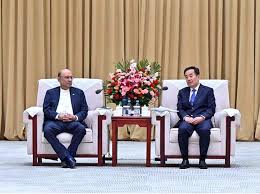Bilawal Bhutto-led Pakistani delegation briefs UNSC’s 10 elected members on deteriorating regional situation

Celina Ali
Islamabad: The high-level Pakistani parliamentary delegation, led by PPP Chairman and former Foreign Minister Bilawal Bhutto Zardari, Monday briefed the Permanent Representatives of the 10 elected members of the UN Security Council on the deteriorating regional security environment resulting from the recent Indian aggression against Pakistan.
Bilawal briefed the elected representatives on the grave implications of India’s aggression against Pakistan in the aftermath of the Pahalgam attack. He categorically rejected India’s baseless and premature allegations against Pakistan, which were made in the absence of any credible investigation or verifiable evidence, according to a press release issued by the Pakistan Mission to the UN.
He highlighted that India’s “reckless” actions — including targeting of civilian areas and the unilateral holding in abeyance of the Indus Waters Treaty — represent a dangerous departure from established rules-based international order, conduct of inter-state relations and pose serious risks to regional stability.
Minister for Climate Change and Environmental Coordination, Musadik Malik, also apprised the elected Council members of humanitarian implications of holding in abeyance of Indus Waters Treaty, which would cause water scarcity, food insecurity and exacerbate the adverse impacts of climate change for 240 million people of Pakistan.
The delegation emphasized that Pakistan’s response to Indian aggression was calibrated, responsible, and fully consistent with international law, including the right of self-defense under Article 51 of the UN Charter.
It underscored Pakistan’s commitment to restraint, revival of the Indus Waters Treaty, and initiation of a comprehensive dialogue to address all outstanding issues with India, particularly the Jammu and Kashmir dispute.
The delegation urged the members of the Security Council to move beyond conflict management and actively support conflict resolution in South Asia.
The elected Council members appreciated Pakistan’s outreach and welcomed its reaffirmation of commitment to peace and diplomacy. They noted the importance of de-escalation, respect for international law, and the peaceful settlement of disputes.
They also emphasized that the UN Charter and its principles must guide state conduct, particularly in regions of high sensitivity such as South Asia. They acknowledged the risks posed by any further escalation and stressed the need to pursue diplomatic solutions.





